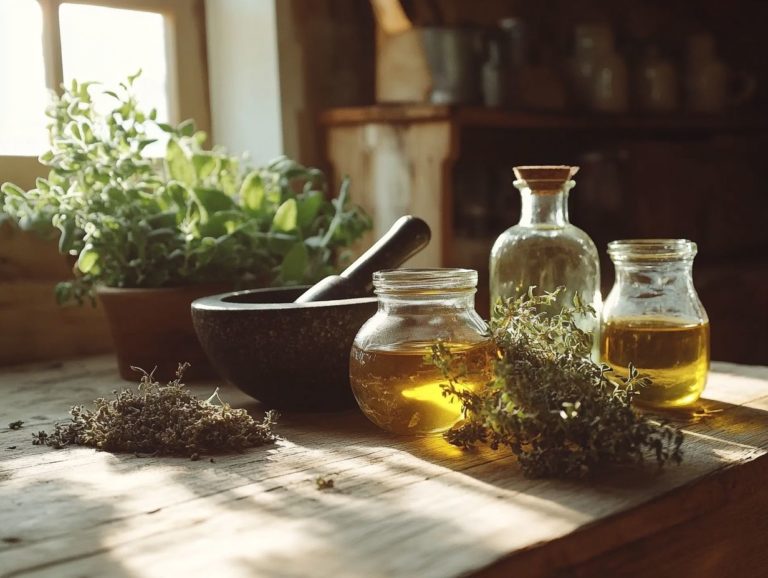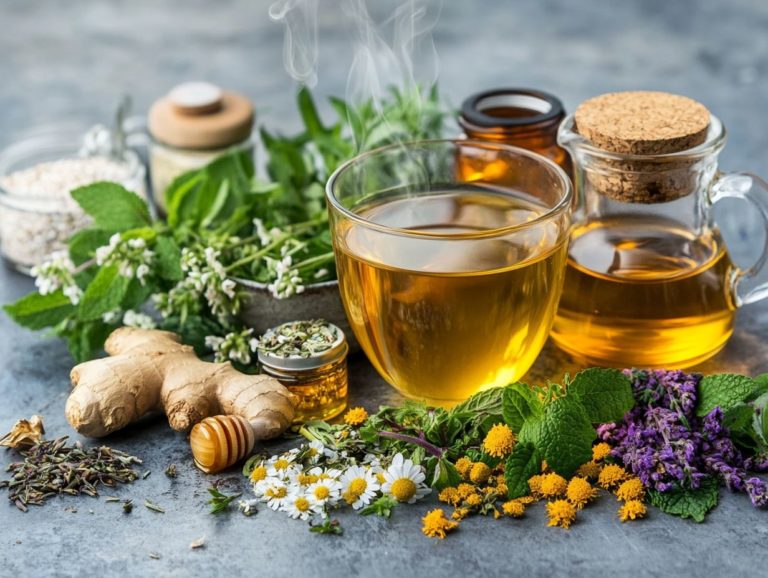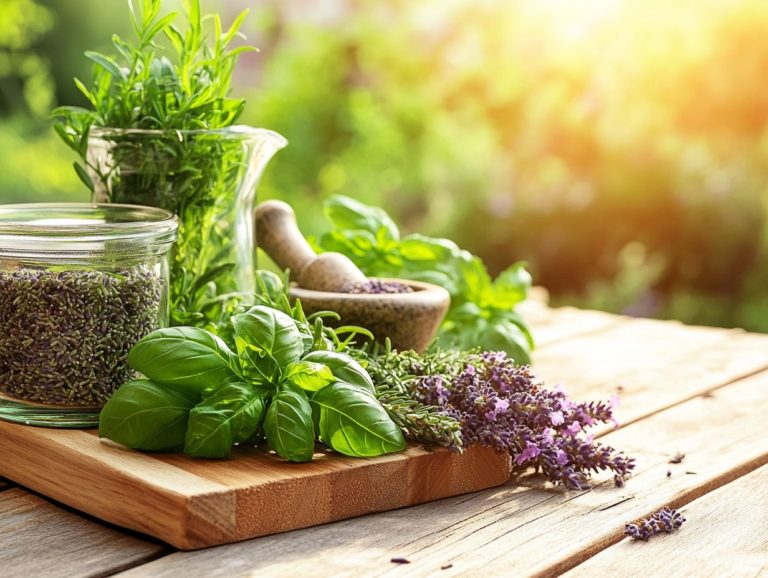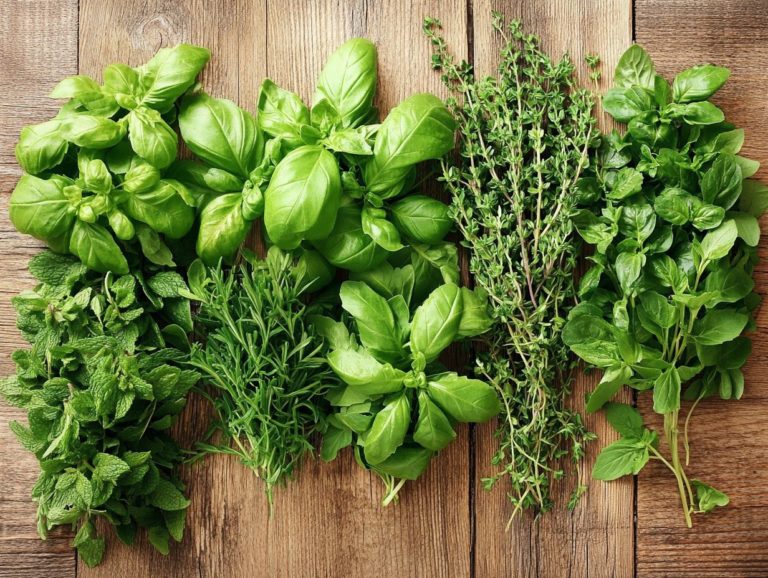5 Must-Have Herbs for Your Garden
Transforming your garden into a vibrant oasis is more attainable than you might imagine, especially when you incorporate five essential herbs: basil, rosemary, thyme, mint, and sage.
These herbs not only enhance the flavor of your dishes but also offer surprising health benefits.
This guide shares tips on the ideal growing conditions, creative uses, preservation techniques, and common pests to keep an eye on.
Prepare to cultivate your green thumb and elevate your culinary endeavors with these indispensable herbs!
Contents
Key Takeaways:
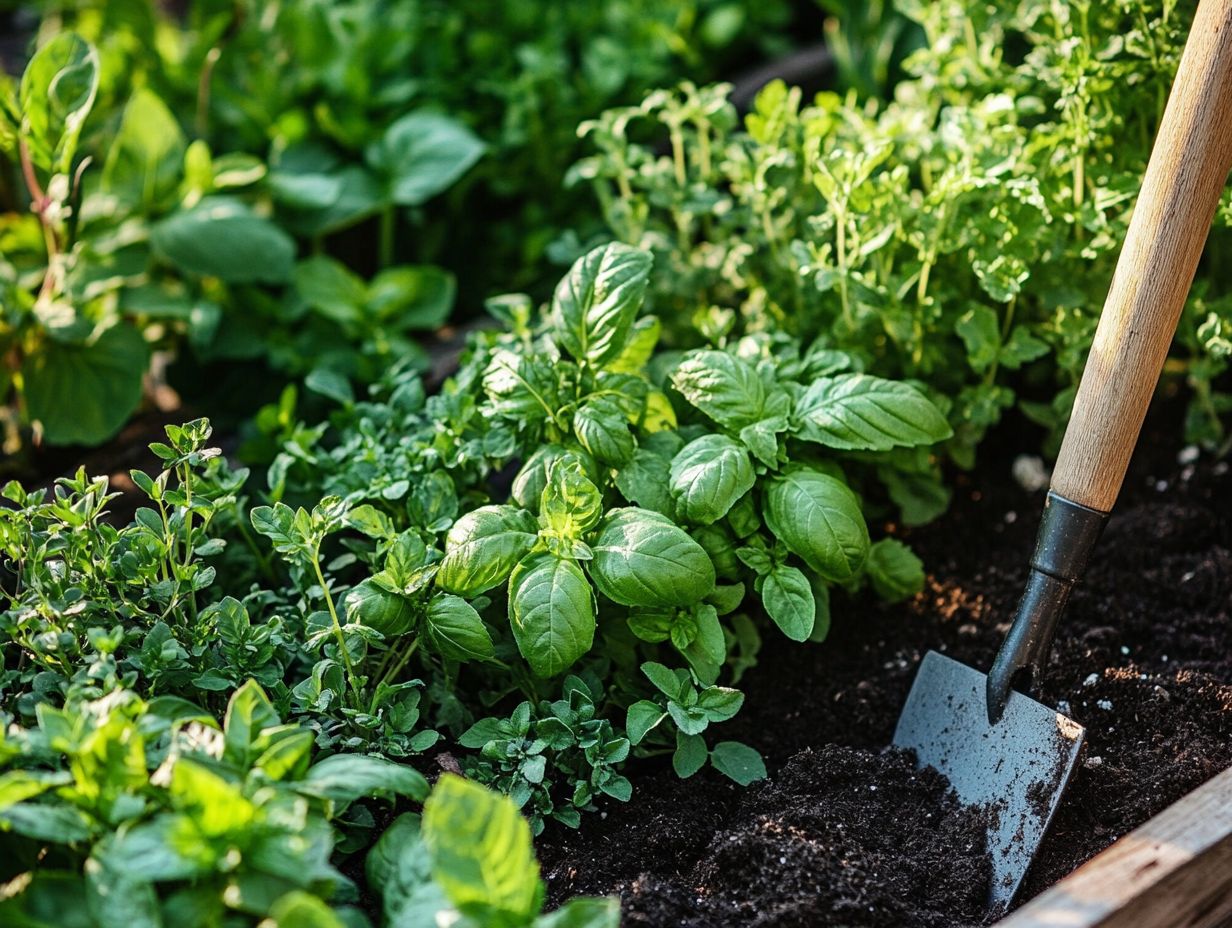
- Basil: A versatile herb that can be grown in containers or in the ground. Provides a fresh and aromatic addition to dishes like pesto, salads, and sauces.
- Rosemary: A hardy and drought-resistant herb that adds a savory and earthy flavor to dishes. Can also be used as a natural air freshener or in homemade cleaning products.
- Thyme: A low-maintenance herb that adds a subtle yet distinct flavor to soups, stews, and marinades. Can also be used as a natural remedy for respiratory and digestive issues.
1. Basil
Basil is an incredibly versatile and aromatic herb that holds a significant place in Mediterranean cuisine. It elevates dishes with its unique flavor profiles and culinary applications, making it a must-have for gardeners and culinary enthusiasts.
Among the various types, Sweet Basil stands out with its subtly sweet, peppery notes, ideal for sauces like pesto and classic Italian recipes. In contrast, Thai Basil brings a more pronounced flavor, infused with hints of anise and spice, perfect for Southeast Asian dishes and vibrant salads.
Beyond their culinary charm, both varieties are celebrated for their herbal remedies, thanks to their properties that can fight germs.
Ready to grow these herbs? Here are some essential tips: ensure well-drained soil and plenty of sunlight, as basil thrives in warm, bright spots, whether indoors or outdoors.
2. Rosemary
Rosemary is an aromatic herb with needle-like leaves, known for its robust flavor that complements a variety of dishes, especially in Mediterranean cuisine. It s essential for both the home cook and the expert gardener.
This herb enhances the taste of meats, lending a distinctive touch to roasted lamb, chicken, and even pork, where its earthy notes truly shine. It also elevates the flavor of breads, offering a savory twist that pairs beautifully with olive oil.
If you’re considering growing this delightful herb, providing well-drained soil and ample sunlight will boost its vitality. Regular pruning and careful watering will ensure a thriving plant, making it a fantastic addition to your kitchen garden.
3. Thyme
Thyme is an exquisite herb that elevates your dishes with its earthy undertones. It s an essential choice for culinary enthusiasts eager to enhance their home cooking through its variety of flavors and techniques.
With options like lemon thyme and creeping thyme, this herb can dramatically transform the taste of soups and stews, adding richness that harmonizes beautifully with seasonal ingredients.
For those of you interested in cultivating thyme, it’s crucial to ensure you provide well-draining soil and ample sunlight to avoid common pitfalls, such as overwatering. Incorporating this versatile herb not only enriches flavor but also adds rustic charm to meals, making it a perfect addition to your home-cooked feasts.
Start your herb garden today and enjoy fresh flavors in your meals!
4. Mint
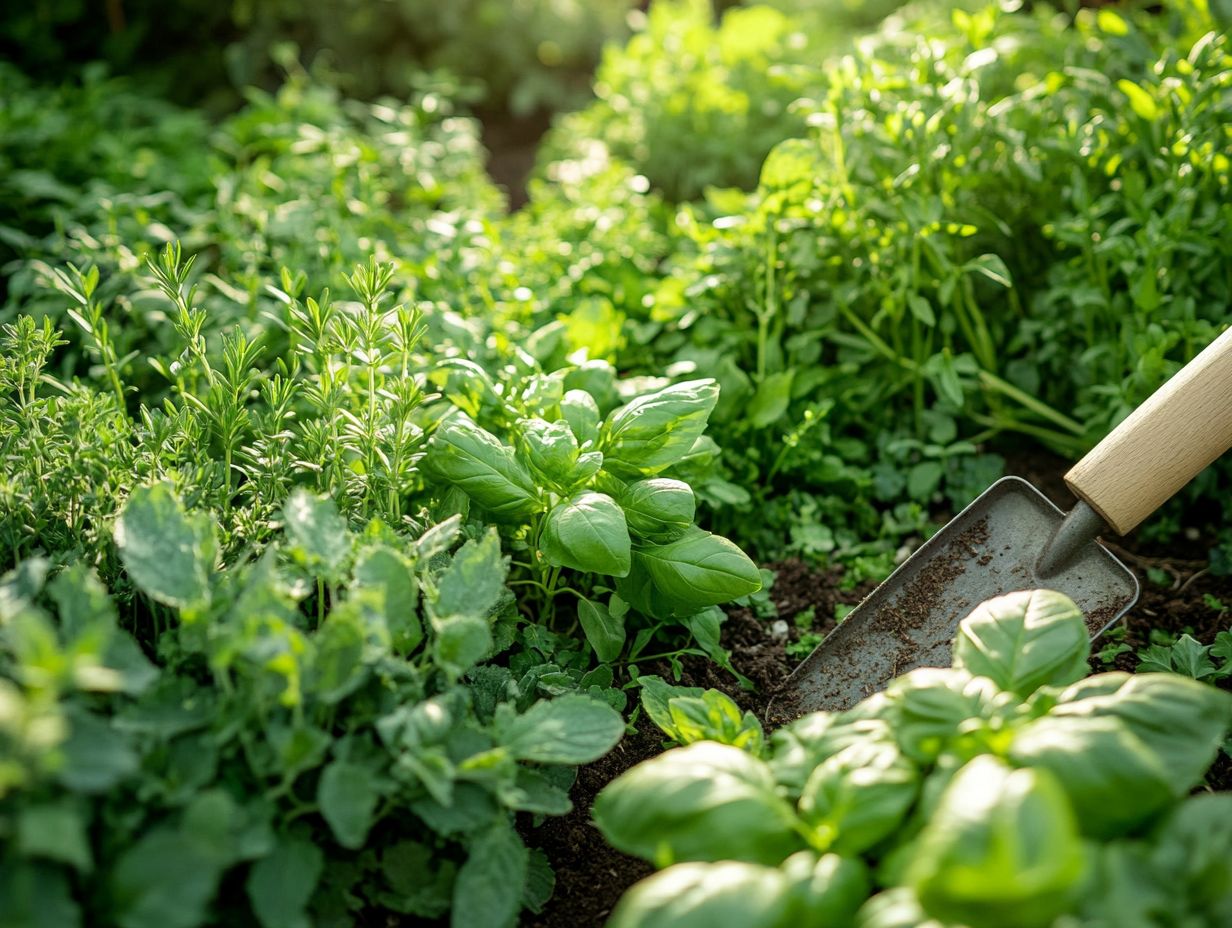
Mint is a vibrant herb that adds freshness to your food dishes. Whether you re making summer salads or trying herbal remedies, it s a must-have for your garden.
The varieties like spearmint, peppermint, and chocolate mint each bring their unique flavors. Spearmint is great for refreshing drinks, while peppermint shines in delicious desserts.
Mint can even enhance savory meals. It adds a delightful touch to lamb and yogurt-based recipes.
If you want to grow mint at home, here are some tips:
- Choose well-draining soil
- Ensure it gets enough sunlight
- Regularly trim to encourage bushier growth
To keep mint fresh, consider storing it in the fridge or freezing the leaves in ice cubes. The possibilities with mint are endless!
5. Sage
Sage has a distinct flavor and is popular in Mediterranean cooking. It s not only valued for its taste but also for its health benefits.
This herb elevates meat dishes, particularly roasted poultry and pork. It creates a delightful blend of flavors, especially in stuffing and sauces.
Sage may help reduce swelling and has antioxidant properties. If you re thinking of growing sage, it thrives in well-drained soil and sunny spots.
How to Grow These Herbs in Your Garden?
Growing herbs like basil, rosemary, thyme, mint, and sage can be a rewarding experience. These fresh herbs not only enhance your dishes but also offer health benefits.
To cultivate these herbs successfully, it s crucial to understand their needs.
- Basil: Thrives in full sunlight for at least six hours and likes well-draining soil rich in organic matter.
- Rosemary: Prefers sandy soil and is drought-resistant, needing less water.
- Thyme: Grows best in a sunny spot with slightly alkaline soil.
- Mint: Needs regular watering and some shade to prevent bolting.
Be careful with over-watering, as it can lead to root rot. Proper spacing between plants helps air circulation.
By following these tips, you ll cultivate a lush herb garden that you can enjoy year-round!
What Are the Best Growing Conditions for These Herbs?
The ideal conditions for herbs like basil, rosemary, thyme, mint, and sage may vary. However, they generally need well-drained soil, plenty of sunlight, and accurate watering to thrive.
Basil flourishes in rich, loamy soil and needs full sun for at least six hours daily. Rosemary loves sandy soil that drains well and prefers a slightly drier environment.
Thyme adapts well but favors dry to moderately moist soil with full sun exposure. Mint, which can be invasive, does best in a pot with nutrient-rich, moist soil.
Sage enjoys well-drained, sandy soil and moderate watering. Regularly pruning your herbs helps them grow bushier and keeps air flowing around the plants, preventing pests.
What Are the Different Ways to Use These Herbs?
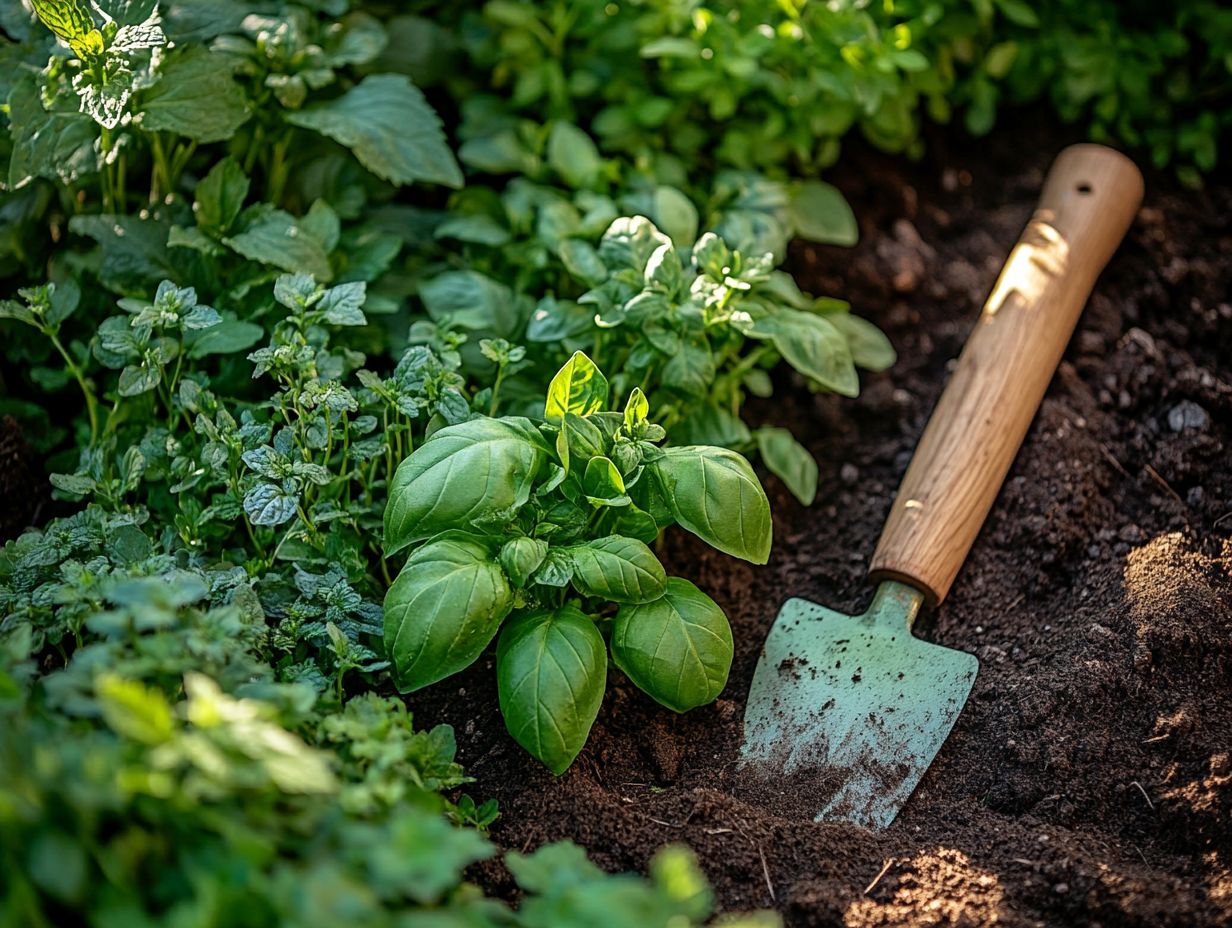
These herbs can be your great cooking partners, enhancing flavor profiles in summer salads and crafting aromatic herbal remedies. They are essential for culinary enthusiasts and home cooks alike.
With their vibrant aromas and robust flavors, these herbs are versatile ingredients ready to elevate countless dishes. A simple sprinkle of fresh basil can turn a basic tomato salad into a delightful Mediterranean feast! When combined with garlic and olive oil, they transform into a fragrant pesto, perfect for tossing with homemade pasta or spreading on crusty bread.
Imagine infusing thyme and rosemary into roasted vegetables to create a delicious side dish that perfectly complements any main course. You can also use herb-infused oils or vinegars to unlock new flavors and explore innovative combinations that will impress your family and friends!
How Can These Herbs Benefit Your Health?
The health benefits of herbs like basil, rosemary, thyme, mint, and sage go far beyond just enhancing your culinary creations. These herbs are packed with aromatic compounds and essential nutrients that can elevate your well-being and serve as effective herbal remedies.
Take basil, for example; it s not only a staple in your kitchen but is also renowned for its anti-inflammatory properties and potential to help manage stress. Rosemary boosts memory and concentration, while thyme helps fight germs and supports your respiratory health. This makes it an ideal companion during chilly months!
And let s not forget mint! It freshens your breath and aids digestion, proving beneficial throughout the year particularly in refreshing summer salads and beverages.
Sage, often celebrated in traditional medicine, supports hormonal health. By incorporating these herbs into your seasonal dishes like tossing fresh basil into summer pasta or brewing soothing sage tea in winter you can seamlessly weave their health benefits into your daily life.
How to Preserve These Herbs for Later Use?
Preserving fresh herbs like basil, rosemary, thyme, mint, and sage can elevate your cooking all year round, ensuring that their vibrant flavors and health benefits are always within reach.
Employing various preservation techniques such as drying, freezing, and creating oil infusions allows you to manage these culinary treasures effectively. Drying concentrates their flavors and extends shelf life, while freezing locks in freshness for soups and stews. Infusing oils with herbs not only preserves their essence but also transforms your cooking medium into something delightful.
These methods are essential! With proper herb management and storage techniques, you can preserve the rich aroma and intense flavor of culinary herbs over time, turning ordinary dishes into extraordinary meals.
What Are Some Common Pests and Diseases That Affect These Herbs?
Common pests and diseases can present considerable challenges for herb gardeners like you, impacting beloved plants such as basil, rosemary, thyme, mint, and sage. Understanding these potential threats is crucial for maintaining a thriving herb garden.
Familiarize yourself with the various insects and fungal infections that target these aromatic plants. For example, basil is especially susceptible to aphids and downy mildew, while rosemary often attracts spider mites and can suffer from root rot.
Implement preventive strategies, like rotating your crops and practicing good sanitation. You can also consider planting certain herbs together to keep pests away. This method, known as companion planting, ensures that each herb has the best chance to thrive.
By prioritizing diligent care and vigilant monitoring, you can cultivate a lush garden that flourishes and elevates your culinary creations!
Frequently Asked Questions
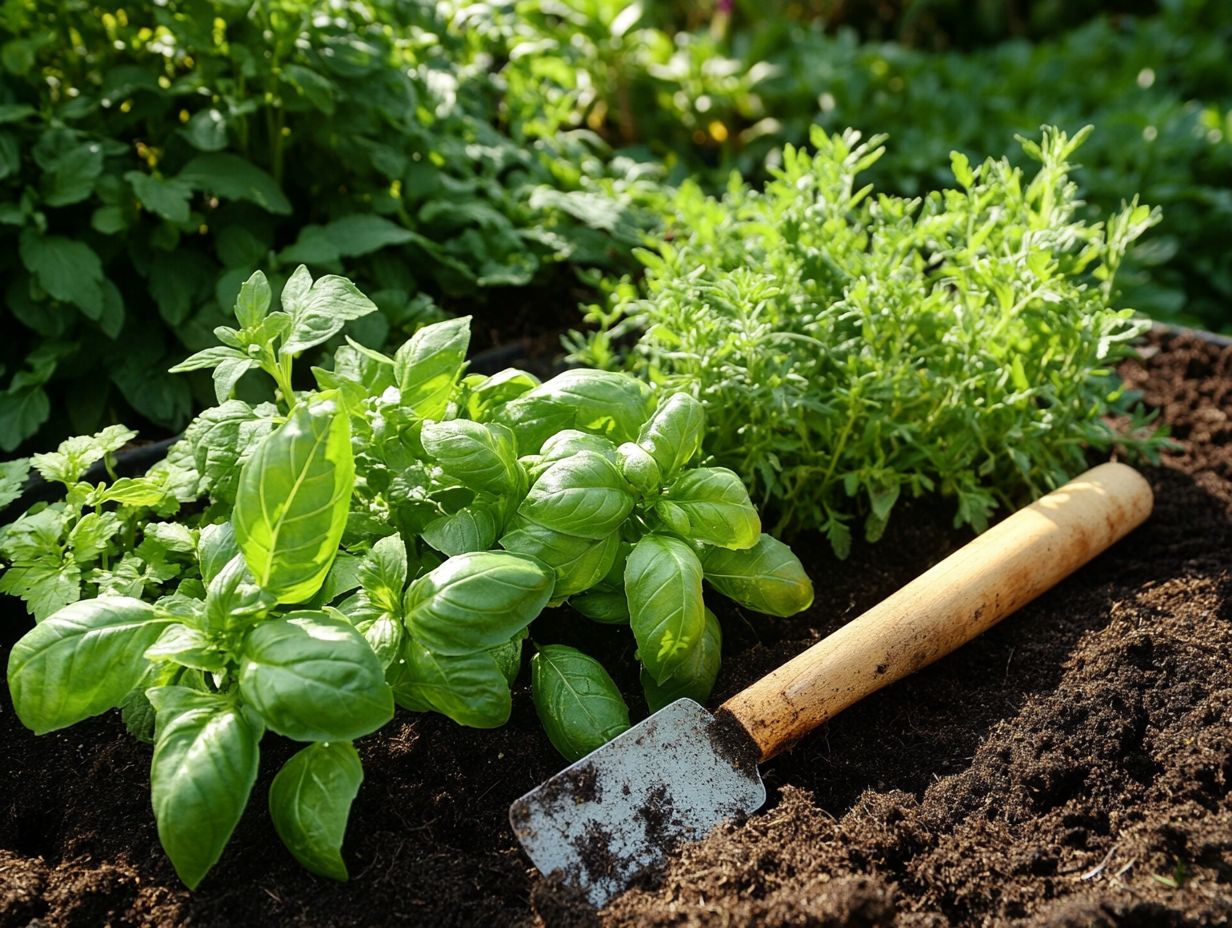
Ready to enhance your cooking with fresh herbs? Start experimenting today!
What are the 5 must-have herbs for your garden?
The must-have herbs for your garden are basil, rosemary, thyme, mint, and sage.
How do these herbs benefit my garden?
Basil, rosemary, and thyme repel pests.
Mint attracts helpful insects, while sage makes the soil better for plants.
Can these herbs be grown in any type of climate?
These herbs are hardy and can grow in many climates.
It’s wise to check their specific needs.
Do I need a large garden to grow these herbs?
No! You can grow these herbs in containers or small gardens.
They fit perfectly in any space.
Can I use these herbs for cooking?
Absolutely!
These herbs are popular in many dishes and add amazing flavor and nutrients.
Are these herbs easy to maintain?
Yes, they are low-maintenance!
They thrive with proper sunlight, water, and occasional pruning.


